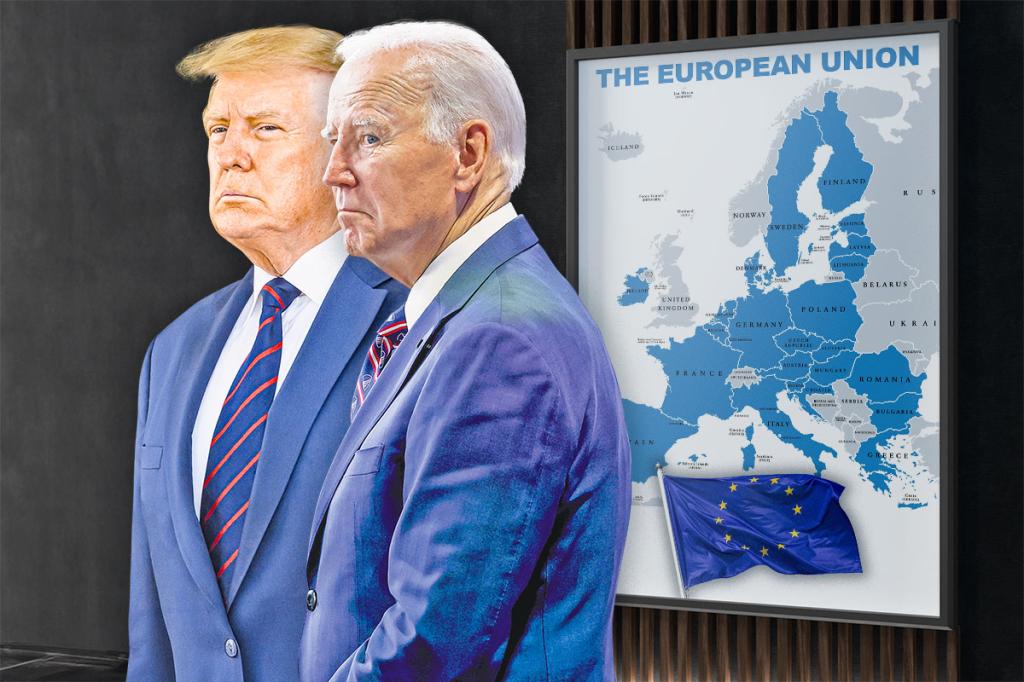Biden is turning his back on Europe


The European Union is good at coming up with inoffensive-sounding terminology to talk about unpleasant things.
For example, the phrase “strategic autonomy” is a nice way of saying, “We don’t trust the Americans” — and, with Donald Trump leading the polls and boasting about encouraging Vladimir Putin to invade European countries, it is impossible to blame them.
It is important to get the context of Trump’s remarks straight: Trump says he told an unidentified NATO counterpart whose country hadn’t met the organization’s target for defense spending, “No, I would not protect you. In fact, I would encourage [Russia] to do whatever the hell they want.”
Despite the fact that Trump — a habitual liar — probably didn’t say what he says he said, what he’s saying now is a statement about how he intends to conduct our affairs if elected.
Forget trying to explain that NATO has a treaty with the United States and not a treaty with Donald Trump. NATO members — and the rest of the world — are getting the message.
And the message isn’t coming only from Trump: Accounting for total goods and services, the European Union is the United States’ largest trading partner, and it has not escaped the attention of public-sector bureaucrats in Brussels or private-sector executives from Stuttgart to Copenhagen that the Biden administration has continued the Trump administration’s anti-trade practices and has, in some cases, made them worse.
The Biden administration has been every bit as contemptuous as the Trump administration when it comes to Europe, ambushing the French with the launch of the Australia-UK-US pact, cutting our allies out of the loop in the Afghanistan withdrawal, hectoring the Germans over their energy policies — all the while believing that our most important negotiating partner in Europe is François Mitterrand, who has been dead for almost 30 years.
Nor is the worry limited to the EU or NATO members.
Israel has found its alliance with the United States undermined by the Democrats’ intraparty politics, including the political pressure to accommodate persistent antisemitism in the party’s urban-progressive wing; Ukraine has found its alliance with the United States undermined by a GOP that is increasingly open in its embrace of Vladimir Putin and his brand of authoritarian rule, with Tucker Carlson has decided to end his career as our generation’s answer to Walter Duranty, the New York Times reporter whose simping for Moscow in the 1930s had him personifying the term “useful idiot.”
Some good things may ultimately come of this, including a European Union that has an army and a measure of real practical independence in policymaking.
But there are other ways of achieving that without surrendering the hard-won US position at the top of world affairs.
Those who would see the United States withdraw from its global leadership role like to hide behind the skirts of fiscal conservatism, which is as morally illiterate as it is economically illiterate.
All foreign affairs spending combined in 2022 amounted to barely 1 percent of federal spending, and foreign aid per se is a little less than half that ($29.4 billion out of a $60.4 billion foreign affairs budget in 2022) a figure so small that it rounds down to zero.
If Washington gave Kyiv everything it asked for, the outlay would amount to a few weeks’ worth of Social Security spending.
Comes the reply: “So, maybe it’s not big money, but that’s still billions sent overseas to foreigners when we could be using it at home.”
In reality, a large share of foreign aid comes in the form of grants for military acquisitions — from US-based companies.
The legitimate complaint about US aid to Israel isn’t that it is a subsidy to a well-off ally but that it is a subsidy for Raytheon.
And there certainly is a corporate welfare aspect to military aid, but Washington also gets something for its money: leverage, for one thing, deeper practical working relationships with workaday defense specialists in allied countries for another, better interoperability of systems, etc.
The US relationship with our European allies, including those in the European Union and NATO, is Washington’s most international connection, both economically and militarily.
If the next century is to be one in which the prevailing global values are those of liberal democracies rather than those of backward autocracies, it will be because the United States and Europe successfully made it so.
If the prevailing global values over the next century are illiberal and authoritarian, it will be because such figures as Putin and Viktor Orbán — and Xi Jinping — had more admirers on the right than we might have expected, while the Jewish State had too many enemies on the left.
But let’s not pretend this is about the money.
Yes, it costs something to maintain the United States’ place at the top of the global power structure — but if we cede that place to Vladimir Putin, Xi Jinping, and the ayatollahs in Tehran, it is going to cost a hell of a lot more.







